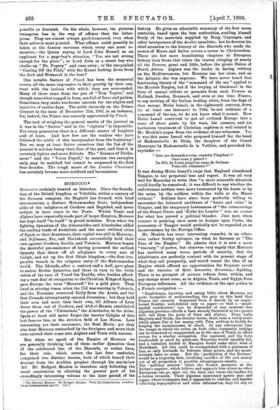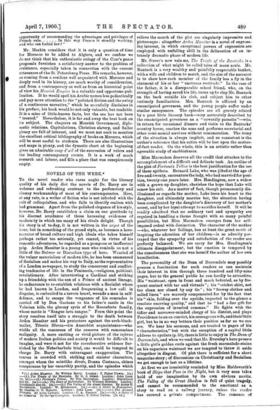MOROCCO.*
MOROCCO certainly wanted an historian. Since the founda- tion of the Idrisid kingdom at Volubilis, within a century of the Saracen conquest, the Maghrib has formed, with brief intermissions, a distinct Mahommedan State, independent alike of the caliphates of Cordova and Baghdad, and never subject in later times to the Porte. Whilst Tunis and Algiers have repeatedly made part of larger Empires, Morocco has kept itself "to itself " in proud isolation. Even when the fighting dynasties of the Almoravides and Almohades added the smiling lands of Andalusia and the most civilised cities of Spain to their dominions, their capital was still in Morocco ; and Sijilmasa, Fez, and Marrakush successfully held their own against Cordova, Seville, and Valencia. Morocco boasts the doubtful pre-eminence of having possessed the earliest dynasty that threw off all allegiance to every sort of Caliph, and set up the first Shiah kingdom,—the first irre- parable breach in the religious unity of the Mahommedan world. The Idrisids, after a century and a half, gave place to native Berber dynasties, and these in turn to the virile rulers of the race of Ynsuf ibn Tashfin, who, besides afford- ing a vast deal of occupation to the Christian Kings of Spain, gave Europe the term " Maravedi" for a gold piece. They lived in stirring times, when the Cid was warring in Valencia, and the Normans recovered Sicily from the Arabs, and the first Crusade triumphantly entered Jerusalem : but they held their own and more than their own, till Alfonso of Leon drove them out of Cordova, and 'Abd-el-Mumin established the power of the "Unitarians," the Almohades, in the Atlas. Spain at least will never forget the warrior Caliphs of this last famous line, or the stricken field of Las Navas. Less interesting are their successors, the Beni Merin : yet they also kept Morocco untouched by the foreigner, and more than once carried their arms into Algiers and Tunis with success.
But when we speak of the Empire of Morocco we are generally thinking less of these earlier dynasties than of the celebrated line of the Shereefs, or rather lines, for their rule, which covers the last four centuries, comprised two distinct houses, both of which traced their descent from the Arabian prophet through his son-in-law 'Ali. Mr. Budgett Meakin is therefore only following the usual association in allotting the greater part of his exceedingly interesting volume to the later period of the
The Moorish Empire. By Budgett Meakin. 'With 215 Illustrations. London : Swan Sonnensehedn and Co. [15s.]
history. He gives an admirable summary of the first seven centuries, based upon the best authorities, availing himself freely of the materials supplied by Dozy, Gayangos, and other interpreters of the Arabic annalists ; but he devotes his chief attention to the history of the Shereefs who made the names of Moors and Sallee rovers a terror to Christendom. There are few more humiliating chapters in European history than those that relate the craven cringing of nearly all the Powers, great and little, before the pirate States of North Africa. Algiers was the leader in daring robbery on the Mediterranean, but Morocco ran her close, and on the Atlantic she was supreme. We have never heard that fascinating theory of the "command of the sea" applied to the Moorish Empire, but if the levying of blackmail in the form of annual tribute or presents from such Powers as Holland, Sweden, Denmark, and even at one time France,
to say nothing of the Italian trading cities, from the days of that savage, Mnlai Ismail, in the eighteenth century, down (in at least one instance) to 1844, be not evidence of a command of the sea, we do not know what it meant. How Mulai Ismail contrived to put all civilised Europe into a state of sheer panic by his wars, his corsairs, and his
barbarous treatment of Christian captives is well related in Mr. Meakin's pages from the evidence of eye-witnesses. Yet it was this same Ismail who proposed himself for the hand of Mademoiselle de Blois, the daughter of the Grand Monarque by Mademoiselle de in Valliere, and provoked the rejoinder :- " Que me demandea-vous, superbe Tingitane ? Osez-vous y penser ?
La fille de Louis jusqu'au rang de Sultane Peut-elle s'abaisser ? "
It was during Mulai Ismail's reign that England abandoned Tangier, to her perpetual loss and regret. It was all very well for Macaulay to write that "a more miserable situation could hardly be conceived; it was difficult to say whether the
unfortunate settlers were more tormented by the heats or by the rains, by the soldiers within the walls or the Moors without." Settlers have since been perfectly willing to encounter the balanced antithesis of "heats and rains" in
Tangier, and the temporary lawlessness of "the outscourings of the Stuart Court and Kirke his Lambs" was no excuse
for what has proved a political blunder. Just now, when rumour is pointing once more to designs upon Ceuta, the possession of Tangier would probably not be regarded as an inconvenience by the Foreign Office.
Mr. Meakin has some interesting remarks, in an other. wise rather frothy epilogue, on what he foresees as " The Fate of the Empire." He admits that it is now a mere " travesty " of power, but observes very sagely that Morocco has survived many worse periods of anarchy, that the inhabitants are perfectly content with its present stage of what they call prosperity, and would resent the idea of an Empire which offered no opportunities for frequent revolt and the exercise of their favourite diversion,—fighting. There is no prospect of serious reform from within, and any change must come, as in Algiers, Tunis, and Egypt, from European influences. All the evidence on the spot points to a French occupation :-
"Englishmen, knowing and caring little about Morocco, are quite incapable of understanding the grip on this land that France has secured. Separated from it merely by an unpro- tected frontier, well-defined only on paper—so that a ' much- needed rectification' can be demanded at any moment—her Algerian province affords a base already furnished at two points with rail from the ports of Oran and Algiers. From Lalla Maghnia and Oojda, the frontier towns, there runs a valley-route which places Fez at her mercy, with Wu, midway to fortify for keeping the mountaineers in check. At any convenient time the forays in which the tribes on both sides constantly indulge can be fomented or exaggerated, as in the case of Tunis, to afford excuse for a similar occupation. Fez captured, and the forts bombarded or awed by gunbDats, Mequinez would speedily fall. and a battalion landed at Mazagan would make short work of Marrakesh. All this could be accomplished with a minimum of loss, as only lowlands lie between those points, and the moun- taineers have no army. But the `pacification of the Berbers' would be a lingering task, involving sacrifice of life and money
out of all proportion to possible advantageous results. . . . The military mission' which the French maintain at the Sultan's expense, which follows and supports him where no other Europeans can go, spies out the land, and trains the leaders for a future invasion. Their Algerian missionary agents pass and repass where foreigners find it impossible to venture, and besides collecting topographical and other information, they let slip no
opporttmity of recommending the advantages and privileges of French- rule. . . . . . In this way France is steadily working, and who can forbid her ?"
Mr. Meakin considers that it is only a question of time for Morocco to be added to Algiers, and we confess we do not think that his enthusiastic eulogy of the Czar's peace proposals furnishes a satisfactory answer to the problem of resistance, especially taken in connection with the current utterances of the St. Petersburg Press. His remarks, however, as coming from a resident well acquainted with Morocco and deeply read in its history, are much worthy of consideration, and from a contemporary as well as from an historical point of view his Moorish Empire is a valuable and opportune pub- lication. If be would spell his Arabic names less pedantically and pay more attention to the "polished diction and the swing of a continuous narrative," which he scornfully disclaims in his preface, his book would be not only valuable, but readable. It is a mine of little-known facts, but the ore has not been " treated." Nevertheless, it is far and away the best book on its subject. The chapters on Moorish Government, diplo- matic relations, Capitulations, Christian slavery, and Sallee piracy are full of interest, and we must not omit to mention the excellent critical bibliography of books on Morocco, which will be most useful to students. There are also illustrations and maps in plenty, and the dynastic chart at the beginning gives an admirable coup d'ceil of the succession of rulers and the leading contemporary events. It is a work of much research and labour, and fills a place that was conspicuously empty.







































 Previous page
Previous page